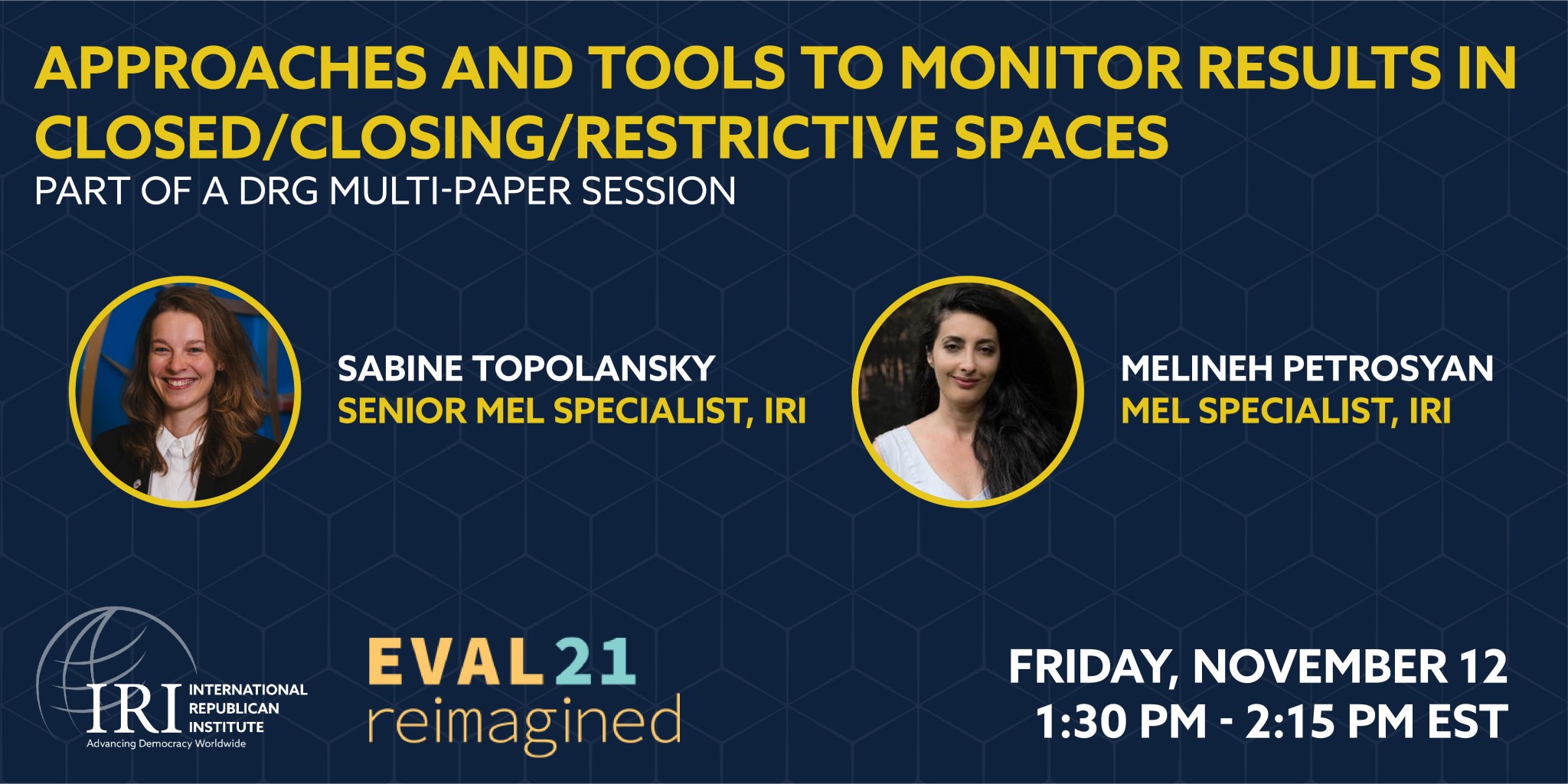IRI’s Monitoring and Evaluation practitioners strengthen skills at the 2021 American Evaluation Association Annual Conference

Last November, members of IRI’s Evidence and Learning Practice (ELP) virtually attended the 35th annual American Evaluation Association conference. This year’s conference, “Meeting the Moment,” served as an opportunity for ELP members and evaluators around the world to share how they have adapted their monitoring, evaluation, and learning (MEL) practices in today’s uncertain times, as well as how they are transforming the way they work to meet the complex challenges of the moment.
The conference included dozens of workshops and presentations on the latest technology, tools, and practices to improve MEL efforts. Among those presenting were three of IRI’s own ELP team: Kimberly Ratcliff, Sabine Topolansky, and Melineh Petrosyan. Other ELP members attended sessions to share ideas with fellow evaluators and stay at the forefront of best practices. After attendance, the ELP team held a reflection session to share insights and discuss new practices to improve those of MEL’s at IRI, with the goal of improving programming across the Institute. The following are the key takeaways from conference sessions on the innovative and inclusive MEL efforts hoped to be integrated over the next year.
1. Evaluators working in the democracy, human rights, and governance (DRG) sector face challenges related to measuring and operationalizing increasingly complex concepts but are developing and implementing innovative approaches to meet these challenges.
Members of the ELP team presented some of these innovative approaches to AEA colleagues in two sessions. The first session focused on two of IRI’s recent quasi-experimental impact evaluations of a program supporting women’s participation in political processes. In the second session, ELP members presented on MEL practices and tips that IRI has developed to gather data in closed, closing, or restrictive environments and ensure stakeholder safety using cybersecurity tools and best practices. Both presentations received positive feedback from attendees, and the ELP team continues to look for opportunities to implement these novel approaches in its evaluations and MEL work more broadly.
2. Word choice matters: language can unify or divide. ELP needs to be intentional and reflective about how and when to use common words and phrases.
In the session, “Words Matter: Adopting Inclusive and Non-Violent Language,” Elizabeth Grim spoke about the importance of developing shared, inclusive language around data and evaluation. It is important that ELP utilizes person-first, gender-neutral, and strengths-based language. For example, instead of using the term “beneficiary,” ELP can use “partner,” as “beneficiary” implies we are giving and they are receiving – which oversimplifies and downplays the role of partners. ELP can say “enhancing capacity” instead of “building capacity,” as to not imply we are starting from ground zero. Adopting inclusive language around data and evaluation is an important piece of IRI’s inclusive MEL approach. By utilizing more inclusive language that resonates in local contexts, ELP can better empower and privilege the voices of partners.
3. Some strategies and techniques used to shift to a virtual environment may still be useful moving forward.
The COVID-19 virtual world introduced challenges for evaluators, particularly in data collection, which often takes place through face-to-face interaction. Because of this, ELP members have had to rely more on local consultants and evaluators as well as virtual tools like video conferencing platforms. This experience validated the importance of collaborating with local actors on evaluation efforts, as they provide crucial knowledge to better inform which methods and approaches are feasible and meaningful in specific country contexts. Now, with some restrictions loosening, the ELP team aims to continue to partner substantively with local organizations and empower each with the skills and experience necessary to conduct evaluations.
IRI’s participation at this year’s conference allowed ELP to reflect on what is working well regarding MEL efforts at IRI and identify opportunities to improve approaches to inclusivity, including through language and partnerships with local organizations.
Top